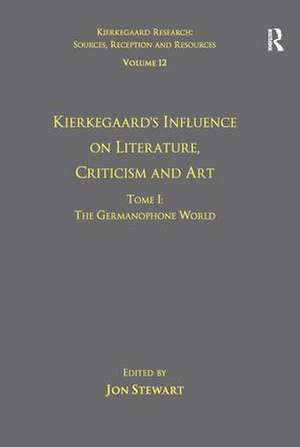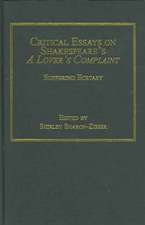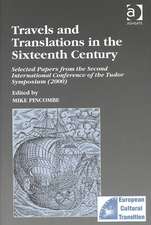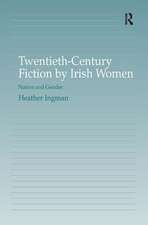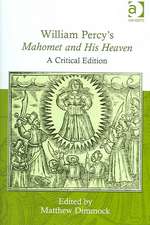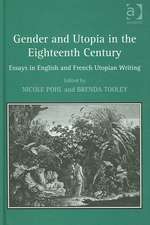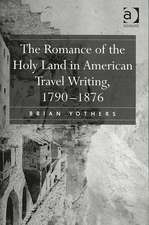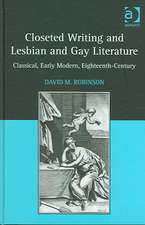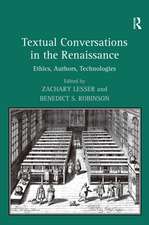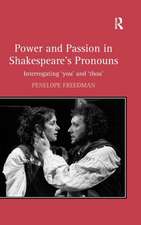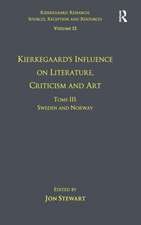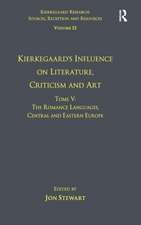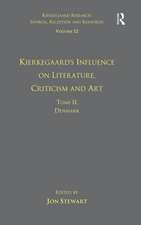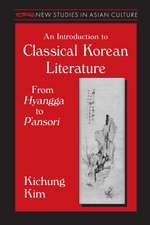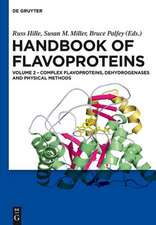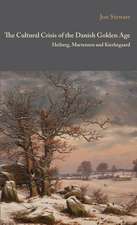Volume 12, Tome I: Kierkegaard's Influence on Literature, Criticism and Art: The Germanophone World: Kierkegaard Research: Sources, Reception and Resources
Autor Jon Stewarten Limba Engleză Paperback – 17 noi 2016
| Toate formatele și edițiile | Preț | Express |
|---|---|---|
| Paperback (1) | 469.34 lei 6-8 săpt. | |
| Taylor & Francis – 17 noi 2016 | 469.34 lei 6-8 săpt. | |
| Hardback (1) | 1059.18 lei 6-8 săpt. | |
| Taylor & Francis – 11 feb 2013 | 1059.18 lei 6-8 săpt. |
Din seria Kierkegaard Research: Sources, Reception and Resources
-
 Preț: 310.71 lei
Preț: 310.71 lei -
 Preț: 386.77 lei
Preț: 386.77 lei - 18%
 Preț: 1055.21 lei
Preț: 1055.21 lei - 18%
 Preț: 1065.78 lei
Preț: 1065.78 lei - 26%
 Preț: 820.71 lei
Preț: 820.71 lei - 18%
 Preț: 1064.19 lei
Preț: 1064.19 lei - 18%
 Preț: 1060.87 lei
Preț: 1060.87 lei - 25%
 Preț: 826.15 lei
Preț: 826.15 lei - 18%
 Preț: 1065.96 lei
Preț: 1065.96 lei -
 Preț: 469.34 lei
Preț: 469.34 lei - 18%
 Preț: 1056.95 lei
Preț: 1056.95 lei - 15%
 Preț: 703.76 lei
Preț: 703.76 lei - 18%
 Preț: 1117.49 lei
Preț: 1117.49 lei - 18%
 Preț: 1054.71 lei
Preț: 1054.71 lei - 18%
 Preț: 1116.27 lei
Preț: 1116.27 lei -
 Preț: 381.28 lei
Preț: 381.28 lei - 26%
 Preț: 765.59 lei
Preț: 765.59 lei - 25%
 Preț: 825.63 lei
Preț: 825.63 lei - 26%
 Preț: 821.13 lei
Preț: 821.13 lei -
 Preț: 469.34 lei
Preț: 469.34 lei - 18%
 Preț: 1061.81 lei
Preț: 1061.81 lei - 18%
 Preț: 1062.31 lei
Preț: 1062.31 lei - 18%
 Preț: 1059.18 lei
Preț: 1059.18 lei - 18%
 Preț: 1059.45 lei
Preț: 1059.45 lei - 18%
 Preț: 1057.75 lei
Preț: 1057.75 lei - 18%
 Preț: 1057.89 lei
Preț: 1057.89 lei -
 Preț: 489.26 lei
Preț: 489.26 lei - 30%
 Preț: 768.82 lei
Preț: 768.82 lei - 18%
 Preț: 1116.77 lei
Preț: 1116.77 lei - 18%
 Preț: 1112.03 lei
Preț: 1112.03 lei - 18%
 Preț: 1067.35 lei
Preț: 1067.35 lei - 18%
 Preț: 1056.00 lei
Preț: 1056.00 lei - 18%
 Preț: 1058.65 lei
Preț: 1058.65 lei - 31%
 Preț: 767.80 lei
Preț: 767.80 lei - 18%
 Preț: 1064.98 lei
Preț: 1064.98 lei - 25%
 Preț: 769.69 lei
Preț: 769.69 lei - 18%
 Preț: 1058.86 lei
Preț: 1058.86 lei - 26%
 Preț: 820.32 lei
Preț: 820.32 lei - 25%
 Preț: 823.17 lei
Preț: 823.17 lei - 26%
 Preț: 821.94 lei
Preț: 821.94 lei - 28%
 Preț: 821.53 lei
Preț: 821.53 lei - 18%
 Preț: 1060.25 lei
Preț: 1060.25 lei - 18%
 Preț: 1055.84 lei
Preț: 1055.84 lei - 26%
 Preț: 850.73 lei
Preț: 850.73 lei - 18%
 Preț: 1054.71 lei
Preț: 1054.71 lei - 25%
 Preț: 854.26 lei
Preț: 854.26 lei
Preț: 469.34 lei
Nou
Puncte Express: 704
Preț estimativ în valută:
89.81€ • 93.77$ • 74.33£
89.81€ • 93.77$ • 74.33£
Carte tipărită la comandă
Livrare economică 04-18 aprilie
Preluare comenzi: 021 569.72.76
Specificații
ISBN-13: 9781138279742
ISBN-10: 1138279749
Pagini: 288
Dimensiuni: 156 x 234 x 15 mm
Greutate: 0.45 kg
Ediția:1
Editura: Taylor & Francis
Colecția Routledge
Seria Kierkegaard Research: Sources, Reception and Resources
Locul publicării:Oxford, United Kingdom
ISBN-10: 1138279749
Pagini: 288
Dimensiuni: 156 x 234 x 15 mm
Greutate: 0.45 kg
Ediția:1
Editura: Taylor & Francis
Colecția Routledge
Seria Kierkegaard Research: Sources, Reception and Resources
Locul publicării:Oxford, United Kingdom
Cuprins
Contents: Preface; Alfred Andersch: reading Søren Kierkegaard as flight to freedom, Alina Vaisfeld; Thomas Bernhard: a grotesque sickness unto death, Stefan Egenberger; Hermann Broch: ‘Nennen’s mir an Bessern’, Steen Tullberg; Friedrich Dürrenmatt: a Swiss author reading and using Kierkegaard, Pierre Bühler; Theodor Fontane: a probable pioneer in German Kierkegaard reception, Julie K. Allen; Max Frisch: literary transformations of identity, Sophie Wennerscheid; Theodor Haecker: the mobilization of a total author, Markus Kleinert; Franz Kafka: reading Kierkegaard, Nicolae Irina; Rudolf Kassner: a physiognomical appropriation, Steen Tullberg; Karl Kraus: ‘the miracle of unison' - criticism of the press and experiences of isolation, Joachim Grage; Thomas Mann: demons and daemons, Elisabete M. de Sousa and Ingrid Basso; Robert Musil: Kierkegaardian themes in The Man Without Qualities, David D. Possen; Rainer Maria Rilke: unsatisfied love and the poetry of living, Leonardo F. Lisi; Martin Walser: the (un-)certainty of reading, Sophie Wennerscheid; Indexes.
Descriere
Tome I explores Kierkegaard’s influence on literature and art in the Germanophone world. He was an important source of inspiration for German writers such as Theodor Fontane, Thomas Mann, Rainer Maria Rilke, Alfred Andersch, and Martin Walser. Kierkegaard’s influence was particularly strong in Austria during the generation of modernist authors such as Rudolf Kassner, Karl Kraus, Robert Musil, and Hermann Broch. Due presumably in part to the German translations of Kierkegaard in the Austrian cultural journal Der Brenner, Kierkegaard continued to be used by later figures such as the novelist and playwright, Thomas Bernhard. His thought was also appropriated in Switzerland through the works of Max Frisch and Friedrich Dürrenmatt. The famous Czech author Franz Kafka identified personally with Kierkegaard’s love story with Regine Olsen and made use of his reflections on this and other topics.
